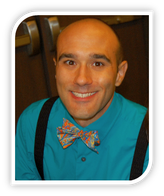While this decision to change the professional degree for entry into the Athletic Training profession is met with some reluctance, I embrace the opportunity to elevate the profession and clinicians we produce. As I begin my time at Indiana State University as Professional Athletic Training Program Director, I am excited to lead the current Professional Program (at the undergraduate level) through the transition to the mater’s level. We anticipate that Indiana State will be the first Professional Athletic Training Program in the state of Indiana offered at a public institution. This is yet another example of how ISU continues to lead the way in Athletic Training education.
As Athletic Training continues to diversify practice settings, the demands simultaneously increase for knowledge, skills and professional capacity of practitioners. As educators, we are tasked with fitting more content into already crammed courses, both in the classroom and laboratory. To have a successful transition in degree level, Athletic Training education has to change to ensure continued success for the profession. This will include changing not only what we teach, but also how we teach, and how we relate to our students. As the profession elevates the entry-level degree from the Bachelor’s to Master’s level, new [and exciting] opportunities and challenges enable educators to position our students to be competent health care professionals that can function both independently and collaboratively in a changing patient care environment. Indiana State has a great history and rich tradition of elevating Athletic Training education. I look forward to continuing that tradition of excellence in preparing the next generation of clinicians.
One addition that I am excited to bring to Athletic Training Programs (both Professional and Post-Professional) at Indiana State will include the infusion of standardized patient (SP) encounters into and throughout the curricula. Standardized patients are individuals that are trained to portray a patient with a specific injury, illness, or condition consistently to a student examiner. Encounters with a SP are more than a mock evaluation; the SP has been intentionally trained to have the medical, social, psychological history of the patient he or she is portraying. Students interact with the SP in the same way they interact with a patient in clinical practice. Despite that SPs are fairly new to Athletic Training, there is a plethora of evidence in medical education, nursing, and physical therapy to support their use. I invite you to attend the Evidence-Based Forum that I am co-presenting on Friday, June 26 from 10:30-11:30am at the NATA Annual Meeting, Rom 131 to learn more about SPs.
Throughout his works, educational philosopher John Dewey has repeatedly noted that the process of education is as important as the destination. As an Athletic Training educator, I find this quote both refreshing and inspiring. I believe that Dewey reminds us that we need to teach students to not only focus on the knowledge and skills needed for professional practice, but also the process of synthesizing information effectively to make clinical decisions. I also believe that Dewey also presents a challenge to educators, namely that educators need to enable students to challenge their assumptions and norms. By ensuring that students feel comfortable asking questions about their own assumptions but also the norms of the profession, we can help shape the critical thinking and decision-making skills of the next generation of health care professionals.
The decision to change the professional degree in Athletic Training to the Master’s level is one that was not made in haste. Countless individuals from numerous professional organizations (in and beyond Athletic Training) collected evidence to make an informed decision, with the intent of improving patient outcomes and ensuring sustained success of the Athletic Training profession. Despite your level of agreement with the decision, join me in supporting our profession through these times of change. I welcome any questions and discussion about how we at Indiana State are transitioning the Professional Athletic Training Program to the Master’s degree level.
It’s a great time to become a Sycamore!
Kirk J. Armstrong, EdD, ATC, LAT

 RSS Feed
RSS Feed
